Birthday trip to Xuan Kong Si
The famous Hanging (or Suspended) monastery close to Mount Hengshan was built by Taoist monks, starting in the sixth century on a rockface, 30 meters above the bottom of the valley. Yes, I walked through all of it, and yes, I was terrified (very low barriers especially for someone of my height, obviously old wood, very far to fall).
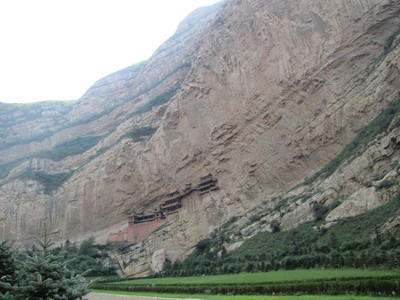
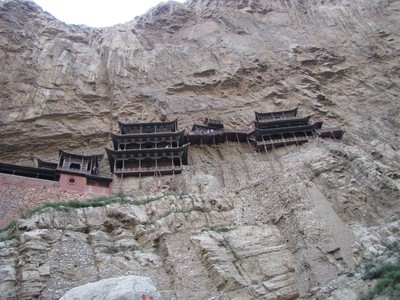
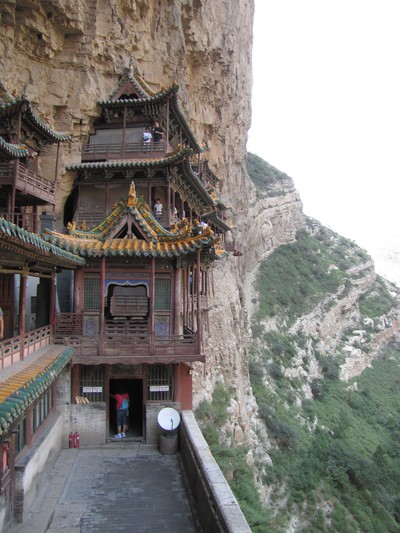
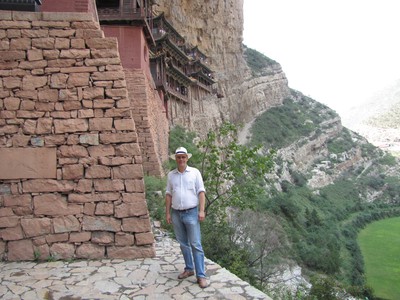
It is very hard to convey in photographs the utter sence of constantly balancing on the edge of a precipice, but perhaps this picture might go some way towards illustrating this. I am not very much given to acrophobia (höjdskräck), but this was a nerve-wracking experience. All the stairways and balconies, etc., were clearly designed for people much smaller than I. The valley in which the monastery is situated is very beautiful: steep walls on most sides, which contributed to the feeling of being a very small creature in a very large context.
The drop below is about 30 meters.

Apparently, these plugs into the mountain is what holds the monastery up on the side of the mountain, together with the long "stilts" under the buildings.


My driver and the car. He drove very well, calmly but fast. The car was clean when we started. This is a picture from when we got back to the hotel.
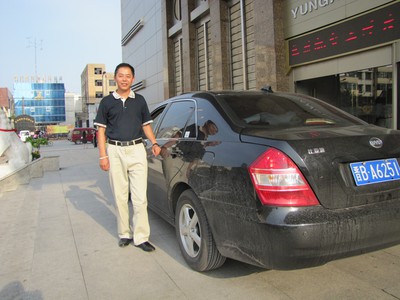




It is very hard to convey in photographs the utter sence of constantly balancing on the edge of a precipice, but perhaps this picture might go some way towards illustrating this. I am not very much given to acrophobia (höjdskräck), but this was a nerve-wracking experience. All the stairways and balconies, etc., were clearly designed for people much smaller than I. The valley in which the monastery is situated is very beautiful: steep walls on most sides, which contributed to the feeling of being a very small creature in a very large context.
The drop below is about 30 meters.

Apparently, these plugs into the mountain is what holds the monastery up on the side of the mountain, together with the long "stilts" under the buildings.


My driver and the car. He drove very well, calmly but fast. The car was clean when we started. This is a picture from when we got back to the hotel.

Birthday trip to Yunguan Shiku (caves)

To celebrate my birthday, I rented a car with a driver who took me to two monasteries (a very close friend apparently found it somewhat amusing that I would celebrate my birthday in monasteries, I am not sure why).
In the morning the Yunguan caves, a short distance from Datong, actually very close to the coal mine. They are a series of 53 man-made grottoes on the southern slopes of the Wuzhou Mountains which stretch over about 1 kilometer. They are enormously rich in Buddhist sculpture, 51,000 in fact, which - according to Baedeker - "betray Indian and Ancient Greek influences."
The largest sculpture is 17 meters tall, while the smallest is only two centimeters.
It all reminded me very much of the Ajanta caves in India, which I visited with my father in 1982. (Perhaps my father might want to scan a couple of pictures from that visit, so I can put them up here). But I think Yungang is richer in sculptures.
According to Weishu, or "The Northern Wei History" (an old history work), the Buddhist monk Tan Yao from Liangzhou persuaded the Northern Wei emperor Wen Cheng Di to begin to build this temple. "Five caves were excavated in the stone wall hewn out of the mountain ridge ... with one Buddha statue carved in each cave.... The carvings were of exceptional excellence and unparalleled throughout the world." The work began in 460.
I bought a beautiful coffetable book (all in Chinese) with pictures much more gorgeous than mine. Its historical introduction by Li Zhigou was translated by Zhang Jie and published in a separate booklet. This translation is excellent (unlike some that I give examples of below).
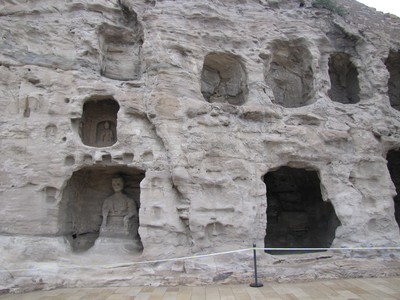




I believe this is Maitreya, whose right arm is supported by a four-armed warrior.
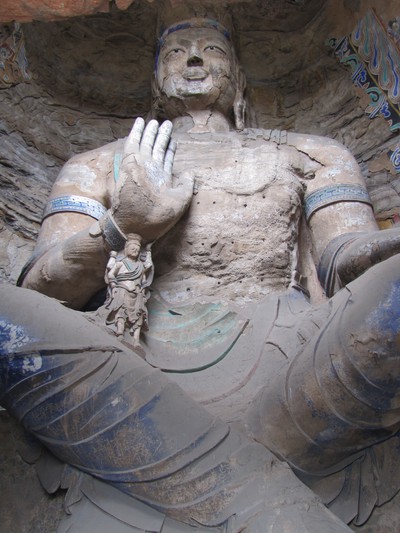
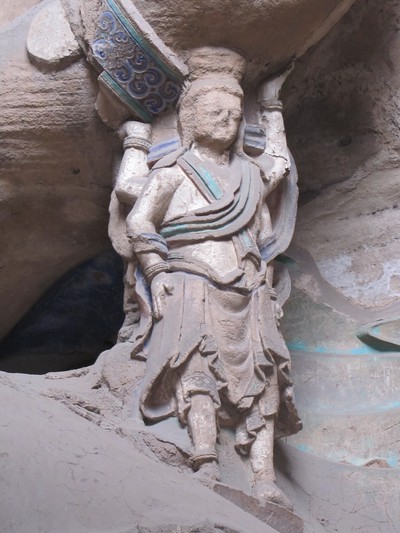

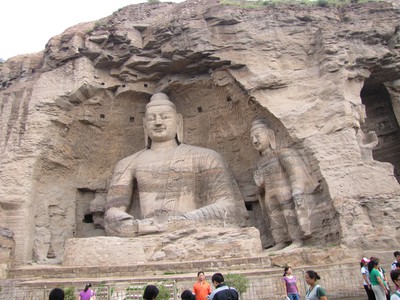
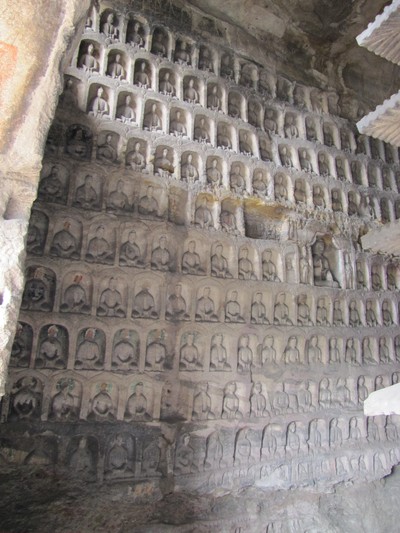
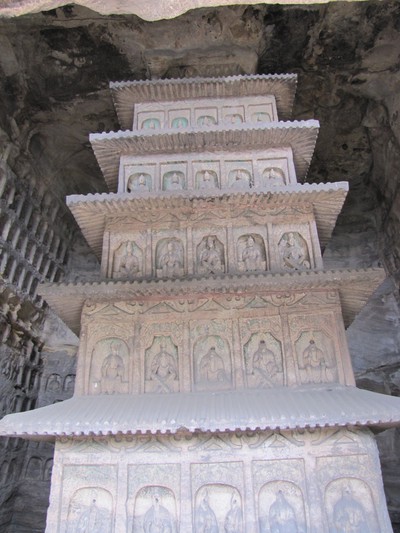
The caves have a website in English!
Language confusion
In general, I think it is very poor sport to make fun of people's short-comings in foreign languages, especially since people who know no or few foreign languages seem to think it is especially fun. I am sure the Chinese find my bold attempts to use their beautiful language as amusing as I find some of what I have seen and heard here in English. So here are some examples, noted by someone who once ordered a sun-flower in a French restaurant, when I wanted a nice, juicy piece of tenderloin ("tournesol" instead of "tournedos"!).
The Guest handbook in my hotel is a treasure trove of sentences worthy of The Private Eye, for example, among the regulations for guests:
3. Please not to smoke on the bed and in the elevators, and the dog-ends are only allowed to put in the ashtrays.
9. Please not walk out the room in barefoot.
12. Any person who involved irregularity like Prostitution, freak-out, smuggle and gambling will be punished according to relative Chinese law.
Poor dogs!
On the inside of the door:
Please don't worry if a fire is occurring We hotel have owned succor scattering facilities to sure you transmitted safely.
Today, I managed to tear open one of those free tea bag that one gets in hotel rooms (some rather good green tea here), since it was wrapped in one of those burglary-proof outer bags. Since they apparently forgot to clean my room today (about which I did not complain, since I really have not made much of a mess), I needed new tea bags. So I pressed the "Housekeeping" button on the phone. I first reached a very nice young lady, who did not speak English. She handed me over to a nice and very apologetic young man, to whom I explained in my best school English ("I seem to have torn a tea bag..."; well not really), than in simplified English, then I tried Chinese (chabao means tea bag), and finally he asked me to spell out each letter. A moment later a housemaid showed up with ... a shopping bag. It was a very nice one, and I am sorry I was not able to put my hands on it. Instead I showed her the torn tea bag, and she immediately came back with half a dozen. When I thanked her, she said something that I interpret as that she was honored to be thanked.
The hotel staff is very sweet and is struggling mightily with English. I have not really met anyone at the hotel with whom I could speak English in a normal way and expect to be understood. I think they are grateful that I am at least bothering to likewise struggle with Chinese.
The Guest handbook in my hotel is a treasure trove of sentences worthy of The Private Eye, for example, among the regulations for guests:
3. Please not to smoke on the bed and in the elevators, and the dog-ends are only allowed to put in the ashtrays.
9. Please not walk out the room in barefoot.
12. Any person who involved irregularity like Prostitution, freak-out, smuggle and gambling will be punished according to relative Chinese law.
Poor dogs!
On the inside of the door:
Please don't worry if a fire is occurring We hotel have owned succor scattering facilities to sure you transmitted safely.
Today, I managed to tear open one of those free tea bag that one gets in hotel rooms (some rather good green tea here), since it was wrapped in one of those burglary-proof outer bags. Since they apparently forgot to clean my room today (about which I did not complain, since I really have not made much of a mess), I needed new tea bags. So I pressed the "Housekeeping" button on the phone. I first reached a very nice young lady, who did not speak English. She handed me over to a nice and very apologetic young man, to whom I explained in my best school English ("I seem to have torn a tea bag..."; well not really), than in simplified English, then I tried Chinese (chabao means tea bag), and finally he asked me to spell out each letter. A moment later a housemaid showed up with ... a shopping bag. It was a very nice one, and I am sorry I was not able to put my hands on it. Instead I showed her the torn tea bag, and she immediately came back with half a dozen. When I thanked her, she said something that I interpret as that she was honored to be thanked.
The hotel staff is very sweet and is struggling mightily with English. I have not really met anyone at the hotel with whom I could speak English in a normal way and expect to be understood. I think they are grateful that I am at least bothering to likewise struggle with Chinese.
Wall of the Nine Dragons
"Feng shui" means "air, water", but the combination also represents the ancient Chinese principles of organizing a house (dwelling or otherwise) in the right way. One basic principle is that the main entrance should face south (as, I am happy to report, does the entrance of my house in New Haven). This avoids some of the risk of the evil spirits that come from the north (wait a minute, where did they get that idea?). But it is not sufficient that the entrance faces south, it should also have a wall in front of it (note to self: build wall outside entrance at home in New Haven). The Wall of the Nine Dragons in Datong is the oldest such wall preserved in China.
It was built in 1392 to protect the residence of Zhu Gui, who was the thirteenth son of Zhu Yanzhang, the first emperor of the Ming dynasty. The residence itself burned down in 1644, but the wall was saved. It is huge. And the dragons are very beautiful. I have several "portrait pictures" of some of them, but the internet connection is so slow here at the hotel that those will have to wait until I am back in Beijing. So please check back, if you are interested.
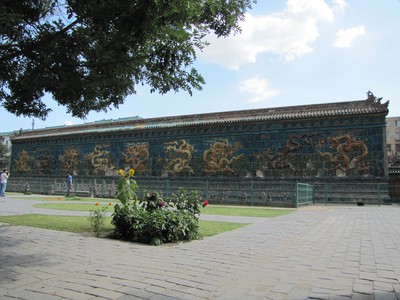
According to my Baedeker (2000) the dragons are "beneficient beings, numbering nine for luck, that are dancing in the clouds, grabbing for dragon pearls."
The dragons certainly look benevolent, even cute.


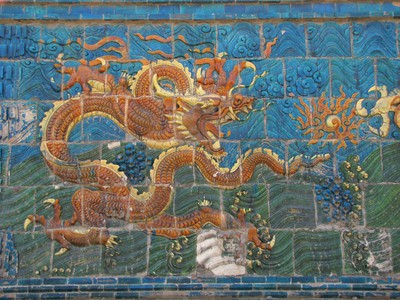
Talking of Baedeker. Anyone who knows me more closely knows that I love Baedeker's travel guides, preferably from before 1914. They are still good. Even this modern one has much attention to detail, more information than flash, and good maps - all features that one is used to from the pre-war editions. And I have to use a modern one since Baedeker treated China very poorly before 1914, with only a few pages about Beijing and the Chinese places on the Manchurian branch of the Transiberian (including, however, Port Arthur) in the 1912 edition. But what has happened to Baedeker's proud tradition of flawless translations into French and English? The 2000 edition is riddled with translation errors.
It was built in 1392 to protect the residence of Zhu Gui, who was the thirteenth son of Zhu Yanzhang, the first emperor of the Ming dynasty. The residence itself burned down in 1644, but the wall was saved. It is huge. And the dragons are very beautiful. I have several "portrait pictures" of some of them, but the internet connection is so slow here at the hotel that those will have to wait until I am back in Beijing. So please check back, if you are interested.

According to my Baedeker (2000) the dragons are "beneficient beings, numbering nine for luck, that are dancing in the clouds, grabbing for dragon pearls."
The dragons certainly look benevolent, even cute.



Talking of Baedeker. Anyone who knows me more closely knows that I love Baedeker's travel guides, preferably from before 1914. They are still good. Even this modern one has much attention to detail, more information than flash, and good maps - all features that one is used to from the pre-war editions. And I have to use a modern one since Baedeker treated China very poorly before 1914, with only a few pages about Beijing and the Chinese places on the Manchurian branch of the Transiberian (including, however, Port Arthur) in the 1912 edition. But what has happened to Baedeker's proud tradition of flawless translations into French and English? The 2000 edition is riddled with translation errors.
大同 Datong
So I am spending three days in Datong, in Shanxi province, six hours by train from Beijing. Many have asked why I wanted to see Datong, both Westerners and Chinese. I even spoke with a representative of the local Turist bureau said that they recommend two days for seeing Datong, and that three days seemed exaggerated (well, that was not the word he used, but what he meant). He was otherwise very helpful
Datong is not just yet another provincial backwater, it was once the capital of China, or at least the Northern half thereof. After the Wei dynasty had unified northern China in 439 they put their capital in Pingcheng, as Datong then was called. This was the high point of Datong, when for example the Yungang caves were constructed (I have visited them and will report).
The city continued to flourish also after the capital was moved in 494 to Luoyang. It contained many Buddhist monasteries, temples, and such, some of which survives. What also survives are remnants of the city wall. So why wonder why I wanted to go to Datong. I am grateful to Xiaojie, who suggested this trip when it turned out to be impossible to get a train ticket for anywhere south of the Huang He (probably too hot there anyway for my northern physiognomy; Datong is at 1216 meters above sea level - that is 3990 ft for those of you who have not yet accepted the Enlightenment - and is pleasantly cooler than Beijing.
Datong is in the middle of a coal field, and there is a huge coal mine not far from the Yungang caves. As places that have access to cheap coal usually are, Datong was a center for steam locomotives. In fact, such engines were manufactured here until 1989, most likely the last factory in the world to produce steam locomotives. According to the guide book I have to the Transsibirian Railroad (the Beijing branch of which goes through Datong), the factory still makes parts for steam engines, but they also say that it is possible to get to go on a guided tour of the factory, if one contacts the Tourist Bureau. That was why I asked the reception to call them. Alas, it is no longer possible, and the train engine museum is closed, or so I was told.
So I will have to do with the medieval stuff!
It is very fun to be here in many ways, but I have particularly noticed that the inhabitants are not used to western tourists. There is an Italian family staying here in the hotel (Datong Yungang International Hotel; recommended!), but they seem very keen to avoid eye contact with me. Otherwise, I have seen very few westerners, and clearly the inhabitants have not seen more. When I am walking on the sidewalks, people look at me. The young ones often giggle, and some (especially the ones in school age) say "hello," to which I always respond "hello, ni hao".
When I walked from the train station to the hotel (a little longer than I had imagined; I have not yet learnt that Chinese blocks are longer than in Ludvika), I was stopped by this charming trio.
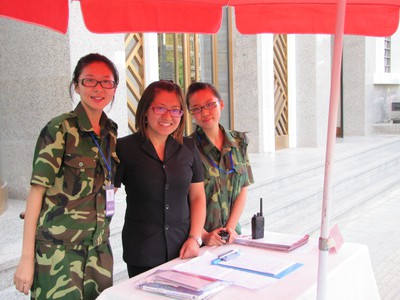
They were in training to staff a hotel that soon will be opened. I think the one in black is a manager, and I suppose it was good training for them to talk with me. We chatted for a while, both in English and Chinese, and they allowed me to photograph them. Otherwise, I have had very little experience of what my new Baedeker from 2000 say: that the Chinese do not like to be photographed. Some have even asked me to photograph them, like these two strapping young men, Messrs. Ma Hui Chao and Jing Wen Hui, with whom I spoke quite a lot. They are students in "Zhong xue", which they translated "Middle school", although I wonder if that would not be what in the USA is called high school (gymnasieskola i Sverige).
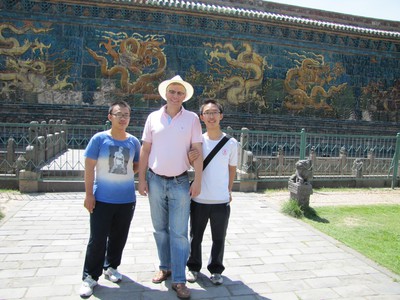
You can also see that at least Hui Chao was not afraid of something else that Baedeker says the Chinese abhor: bodily contact. He grabbed me as you can see. Soon there were more people who wanted to be in a picture. They insisted to give me their telephone numbers, and they got mine.
All in all, people here are amazingly friendly and willing to work to understand and to make themselves understood. I think it helps that I bothered to learn some phrases in Chinese. People, by the way, praise my pronounciation, which surely is largely politeness, but also a reflection of that I had a very good teacher in Joyce.
I occasionally feel the smell of burning coal, but not particularly often. There is at least one giant thermal power plant just outside town, with at least five enormous chimneys that spew out dense smoke. Those must be fired by coal. The town is also very dusty. My shoes are light brown when I come in, but I have noticed no accumulation of coal soot on collars and such, as one is supposed to get in coal towns. The air is supposed to be very polluted, but as in Beijing, I have had no immediate problems with that. Although I suppose that yellow tinge to these clouds might not be entirely healthy.

Well, this as an introduction to Datong. I will deal with specific issues in separate entries. Here follows some assorted photos from the city.
Feuerwehr? Well, the Datong fire brigade sports a German sobriquet.
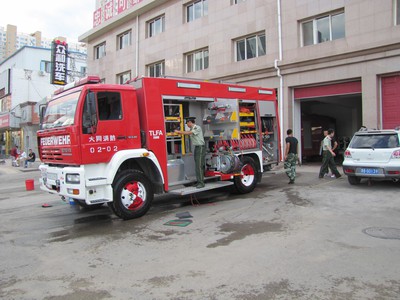
There are many street vendors in Datong, often selling off the back of a pickup truck.
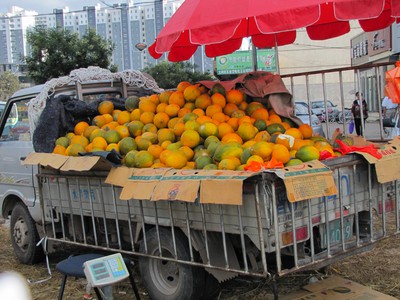
Garbage collection in Datong. I am sorry for these poor people.
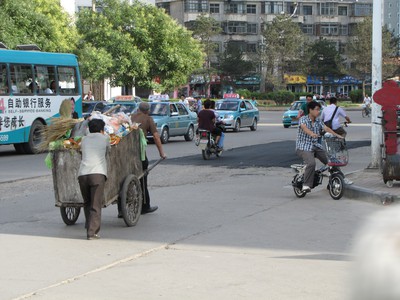
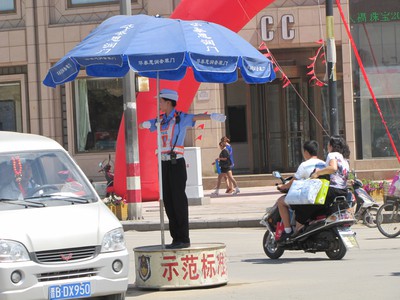
No, I have not tried this restaurant. And I will not.
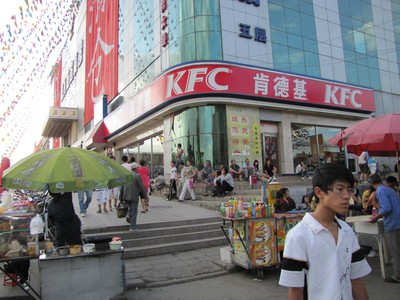
Datong is not just yet another provincial backwater, it was once the capital of China, or at least the Northern half thereof. After the Wei dynasty had unified northern China in 439 they put their capital in Pingcheng, as Datong then was called. This was the high point of Datong, when for example the Yungang caves were constructed (I have visited them and will report).
The city continued to flourish also after the capital was moved in 494 to Luoyang. It contained many Buddhist monasteries, temples, and such, some of which survives. What also survives are remnants of the city wall. So why wonder why I wanted to go to Datong. I am grateful to Xiaojie, who suggested this trip when it turned out to be impossible to get a train ticket for anywhere south of the Huang He (probably too hot there anyway for my northern physiognomy; Datong is at 1216 meters above sea level - that is 3990 ft for those of you who have not yet accepted the Enlightenment - and is pleasantly cooler than Beijing.
Datong is in the middle of a coal field, and there is a huge coal mine not far from the Yungang caves. As places that have access to cheap coal usually are, Datong was a center for steam locomotives. In fact, such engines were manufactured here until 1989, most likely the last factory in the world to produce steam locomotives. According to the guide book I have to the Transsibirian Railroad (the Beijing branch of which goes through Datong), the factory still makes parts for steam engines, but they also say that it is possible to get to go on a guided tour of the factory, if one contacts the Tourist Bureau. That was why I asked the reception to call them. Alas, it is no longer possible, and the train engine museum is closed, or so I was told.
So I will have to do with the medieval stuff!
It is very fun to be here in many ways, but I have particularly noticed that the inhabitants are not used to western tourists. There is an Italian family staying here in the hotel (Datong Yungang International Hotel; recommended!), but they seem very keen to avoid eye contact with me. Otherwise, I have seen very few westerners, and clearly the inhabitants have not seen more. When I am walking on the sidewalks, people look at me. The young ones often giggle, and some (especially the ones in school age) say "hello," to which I always respond "hello, ni hao".
When I walked from the train station to the hotel (a little longer than I had imagined; I have not yet learnt that Chinese blocks are longer than in Ludvika), I was stopped by this charming trio.

They were in training to staff a hotel that soon will be opened. I think the one in black is a manager, and I suppose it was good training for them to talk with me. We chatted for a while, both in English and Chinese, and they allowed me to photograph them. Otherwise, I have had very little experience of what my new Baedeker from 2000 say: that the Chinese do not like to be photographed. Some have even asked me to photograph them, like these two strapping young men, Messrs. Ma Hui Chao and Jing Wen Hui, with whom I spoke quite a lot. They are students in "Zhong xue", which they translated "Middle school", although I wonder if that would not be what in the USA is called high school (gymnasieskola i Sverige).

You can also see that at least Hui Chao was not afraid of something else that Baedeker says the Chinese abhor: bodily contact. He grabbed me as you can see. Soon there were more people who wanted to be in a picture. They insisted to give me their telephone numbers, and they got mine.
All in all, people here are amazingly friendly and willing to work to understand and to make themselves understood. I think it helps that I bothered to learn some phrases in Chinese. People, by the way, praise my pronounciation, which surely is largely politeness, but also a reflection of that I had a very good teacher in Joyce.
I occasionally feel the smell of burning coal, but not particularly often. There is at least one giant thermal power plant just outside town, with at least five enormous chimneys that spew out dense smoke. Those must be fired by coal. The town is also very dusty. My shoes are light brown when I come in, but I have noticed no accumulation of coal soot on collars and such, as one is supposed to get in coal towns. The air is supposed to be very polluted, but as in Beijing, I have had no immediate problems with that. Although I suppose that yellow tinge to these clouds might not be entirely healthy.

Well, this as an introduction to Datong. I will deal with specific issues in separate entries. Here follows some assorted photos from the city.
Feuerwehr? Well, the Datong fire brigade sports a German sobriquet.

There are many street vendors in Datong, often selling off the back of a pickup truck.

Garbage collection in Datong. I am sorry for these poor people.


No, I have not tried this restaurant. And I will not.

Jag idag 17 augusti 2010
Två jag idag på födelsedagen: på morgonen och på eftermiddagen.
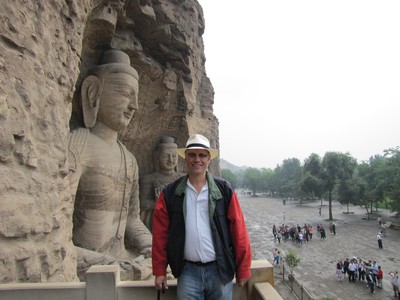
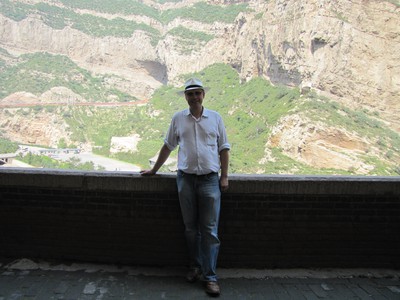


Jag idag 16 augusti 2010
Jag har massor av bilder från de senaste två dagarna i Datong med omnejd, men jag får väl börja med två Jag idag-bilder. :)
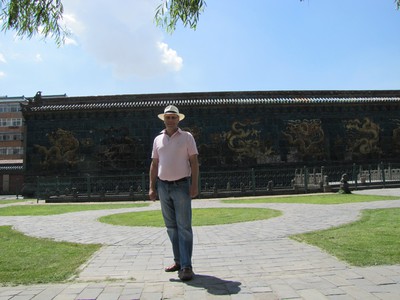
Den här är tagen framför Muren med nio drakar.

Den här är tagen framför Muren med nio drakar.
Day 3 in Beijing
I have mostly spent the day setting things up in my apartment and preparing for tomorrow's trip. I am going to take the train to Datong, which is an historically interesting town some distance to the north-west of Beijing. The train leaves at 9.26 and will take about six hours. There seem to be really interesting things in this town, so I am much looking forward to seeing it. I will return on Thursday.
I haven't been playing with my camera today; hence no pictures. But it was a good day. I feel that I am more settled in the apartment. I went out to shop a few things that I felt I need, such as indoor slippers, kitchen towels, and a few other odds and ends. In the evening, I had dinner with Ningping and Denise who works for the Stanford program. We talked about various places to which one might take the students. Apparently, there is some kind each Friday in our program. We all start off with a longer trip before classes start, but the destination has not yet been announced (although a little bird whispered in my ear, and it is a very exciting trip).
The hotel I am staying at (Datong Yungang International Hotel) is supposed to have free wireless. I bring my small computer, and if I can get it to work, I might make updates from the road.
I haven't been playing with my camera today; hence no pictures. But it was a good day. I feel that I am more settled in the apartment. I went out to shop a few things that I felt I need, such as indoor slippers, kitchen towels, and a few other odds and ends. In the evening, I had dinner with Ningping and Denise who works for the Stanford program. We talked about various places to which one might take the students. Apparently, there is some kind each Friday in our program. We all start off with a longer trip before classes start, but the destination has not yet been announced (although a little bird whispered in my ear, and it is a very exciting trip).
The hotel I am staying at (Datong Yungang International Hotel) is supposed to have free wireless. I bring my small computer, and if I can get it to work, I might make updates from the road.
Skype med barnen
Idag har jag pratat på Skype med mina söta barn. Elsa visade flera av sina dockor.
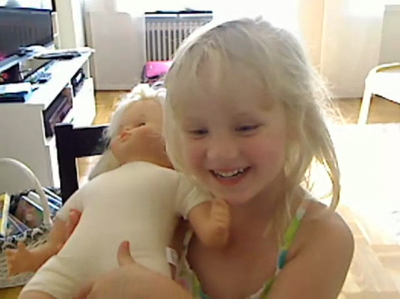
Hjalmar visade mig sitt Pokemonspel.
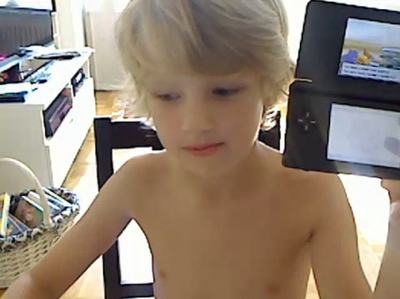
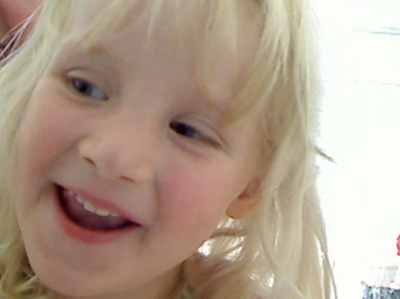

Hjalmar visade mig sitt Pokemonspel.


Noam Chomsky doctorate and lecture
Today's big event on campus was that the great linguist and political thinker Noam Chomsky was there to pick up an honorary doctorate and to give a public lecture. He seemed sprightly at 81. His lecture was entitled "Contours of World Order: Continuities and Change." He spoke intelligently from a carefully prepared manuscript, with a calm voice, even though some of what he said was controversial.
Afterwards, there was a question and answer-period led by a Chinese-born Harvard professor, who collected questions in writing from the audience. A large group of student voluntaries collected the questions from the audience and brought them up on stage. The first question contrasted the Chinese admiral Zheng He, who explored in the Indian Ocean in the early fifteenth century, with Christopher Columbus. While the latter followed colonial instincts that would lead to much violence, Zheng's expeditions were (by and large) peaceful and did not pursue colonialism.
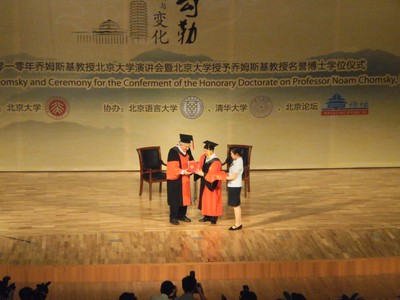

More than 2000 people, mostly students, had come to listen.

It was a beautiful auditorium, but - alas - the seats were not constructed for anyone of a height that in Sweden is considered rather normal. I was definitely squeezed in, which in the end was very painful. Thus, I left when the question period began (although the questions I heard were unusually good for such circumstances).
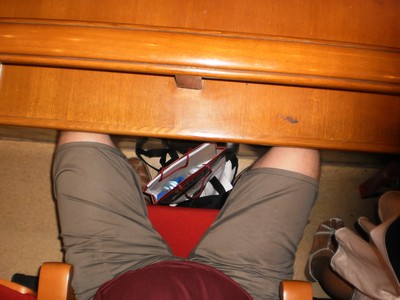
Afterwards, there was a question and answer-period led by a Chinese-born Harvard professor, who collected questions in writing from the audience. A large group of student voluntaries collected the questions from the audience and brought them up on stage. The first question contrasted the Chinese admiral Zheng He, who explored in the Indian Ocean in the early fifteenth century, with Christopher Columbus. While the latter followed colonial instincts that would lead to much violence, Zheng's expeditions were (by and large) peaceful and did not pursue colonialism.


More than 2000 people, mostly students, had come to listen.

It was a beautiful auditorium, but - alas - the seats were not constructed for anyone of a height that in Sweden is considered rather normal. I was definitely squeezed in, which in the end was very painful. Thus, I left when the question period began (although the questions I heard were unusually good for such circumstances).

Jag idag fredag
For my traditional "Jag idag"-bild, I get to stand in front of the banderoll announcing that Noam Chomsky will get an honorary doctorate and will give a public lecture today.


Noodle dinner at Campus
Ningping and I had dinner on campus at a student restaurant that is actually called Campus. They only serve noodles. I ordered Chicken Curry noodle soup (and I ordered it myself, in Chinese, and was understood), which was very tasty indeed. It cost 5 RMB, for a large bowl, which was very large.
Outside the restaurant there were rows of bikes parked. The students bicycle a lot on campus, often at quite some speed, as they carefully maneuvre around pedestrians.
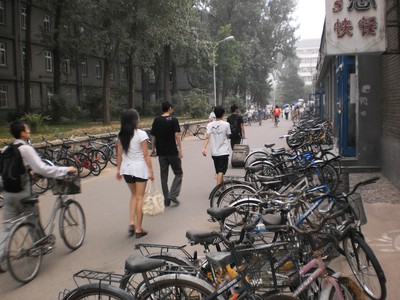
The restaurant.
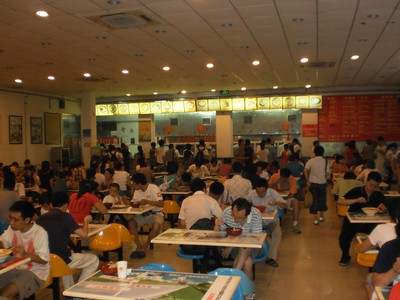
Me enjoying my noodles, which really were very good. They must have been freshly made; indeed, one could see people making noodles in the kitchen.

Outside the restaurant there were rows of bikes parked. The students bicycle a lot on campus, often at quite some speed, as they carefully maneuvre around pedestrians.

The restaurant.

Me enjoying my noodles, which really were very good. They must have been freshly made; indeed, one could see people making noodles in the kitchen.

My Chinese fountain pen
Yesterday, I bought a fountain pen at the Metro store. Today I used it for the first time. It works very well. The picture is from my office, and the pen rests on the edited manuscript of my book.
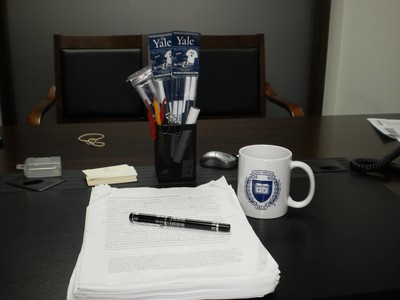

My second day in China
I did not sleep very well the first night in Beijing, so instead I slept rather much in the morning. I did not get to the office until about 2. Ningping was going with her husband to sign the lease for the apartment that will be inhabited by my colleagues Tina and Stuart when they arrive in a few days. So to get there we took the subway. Clean and pleasant, very convenient (there is a stop a few hundred meters from where I live). The glass wall separates us from the train until it has stopped and lined up its doors with those in the wall. Then the doors open.
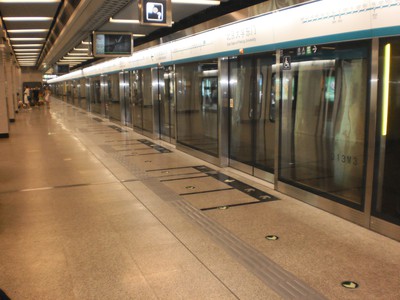
The inside look. The first train we took was not too crowded.

When we changed to line 10, there were more people who wanted to get on.
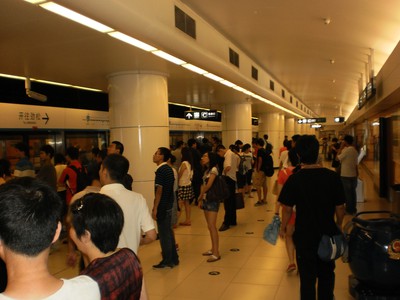
The apartment that my colleagues will get is very plesant, with a gorgeous view in all directions from the 17th floor. I noticed particularly the beautiful kitchen with a gas stove and also ... a revolving book case, the kind I always wanted. The landlord was able to tell me where he had bought it. While Ningping signed the paperwork, her husband Lejing and I walked to a shopping center. We spotted these two gentlemen on the way, and since I have had a request for photos of this kind of hat, I photographed them.
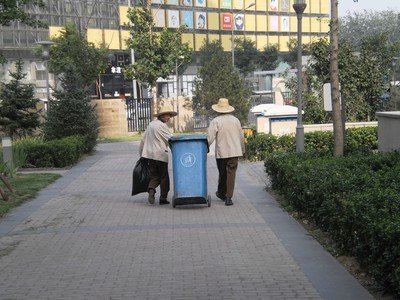
There was a tea store in the shopping center, where we were invited to taste tea. I bought some rather good tea.

In the basement of the shopping center, there was a large store of the German chain Metro. This was a wonderful place to walk around and look at what they had. I bought laundry detergent, wine, towels, pasta, a tin of crushed tomatoes, muesli, and various other odds and ends, including a fountain pen for 25 yuan (4 dollars!) and four bottles of blue ink for even less.
In the evening, Ningping and Lejing brought me to the Teachers dining hall at Beida. One went up to windows where food in various Chinese regions styles were offered (one style per window). Plus in one of the windows, one could pick out fresh vegetables which they then stir fried with the sauce of one's choice. Everything was amazingly fresh, and I had a good meal for very little expense (6.50 yuan, I think, plus 1.20 for a bottle of water).


The red banderoll reads: "The satisfaction of teachers and students is our highest priority." Why doesn't Yale have banderolls like that?
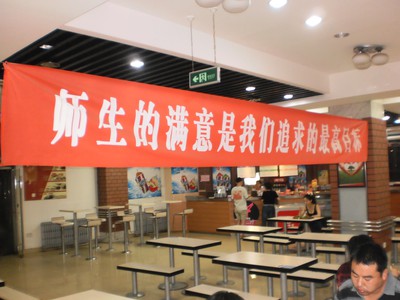
Ningping and Lejing.
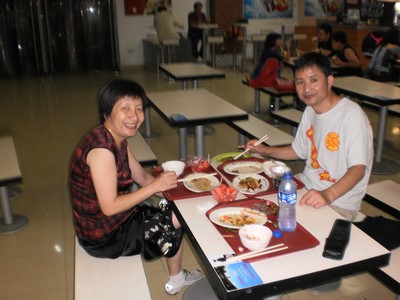
Here is a picture of only Lejing from the subway earlier in the day.

The kitchen were vegetables are stir-fried to order.
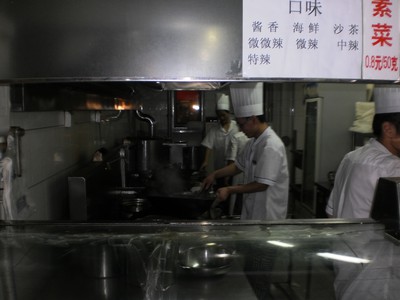
Finally, a picture from the West Gate of Peking University, which is its main entrance. The sign above the gate says "Beijing Daxue" and the calligraphy was made by none other than Mao Zedong. A lot of people where there photographing the sign.


The inside look. The first train we took was not too crowded.

When we changed to line 10, there were more people who wanted to get on.

The apartment that my colleagues will get is very plesant, with a gorgeous view in all directions from the 17th floor. I noticed particularly the beautiful kitchen with a gas stove and also ... a revolving book case, the kind I always wanted. The landlord was able to tell me where he had bought it. While Ningping signed the paperwork, her husband Lejing and I walked to a shopping center. We spotted these two gentlemen on the way, and since I have had a request for photos of this kind of hat, I photographed them.

There was a tea store in the shopping center, where we were invited to taste tea. I bought some rather good tea.

In the basement of the shopping center, there was a large store of the German chain Metro. This was a wonderful place to walk around and look at what they had. I bought laundry detergent, wine, towels, pasta, a tin of crushed tomatoes, muesli, and various other odds and ends, including a fountain pen for 25 yuan (4 dollars!) and four bottles of blue ink for even less.
In the evening, Ningping and Lejing brought me to the Teachers dining hall at Beida. One went up to windows where food in various Chinese regions styles were offered (one style per window). Plus in one of the windows, one could pick out fresh vegetables which they then stir fried with the sauce of one's choice. Everything was amazingly fresh, and I had a good meal for very little expense (6.50 yuan, I think, plus 1.20 for a bottle of water).


The red banderoll reads: "The satisfaction of teachers and students is our highest priority." Why doesn't Yale have banderolls like that?

Ningping and Lejing.

Here is a picture of only Lejing from the subway earlier in the day.

The kitchen were vegetables are stir-fried to order.

Finally, a picture from the West Gate of Peking University, which is its main entrance. The sign above the gate says "Beijing Daxue" and the calligraphy was made by none other than Mao Zedong. A lot of people where there photographing the sign.

At home in Zhongguanyuan, Beijing
It is notoriously difficult to photograph interiors, but here follows an attempt to picture my new home. Easy walking distance from Peking University (or Beida, as it is generally known here, abbreviated from Beijing Daxue).
But first an exterior photo of this living complex, which contains both hotel rooms, student rooms, and apartments.
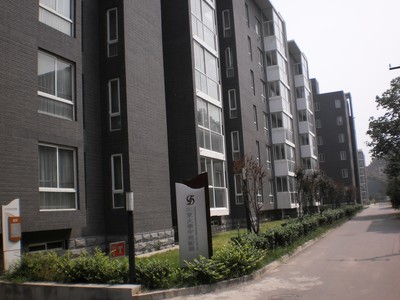
One gets directly into the living room from the front door.

The kitchen is at one end of the living room.

A hallway leads from the living room/kitchen into the rest of the apartment. One gets to these rooms from the hallway, on the left side: guest bath room, study, master bath room. On the right: Guest bedroom and master bed room. The bathroom sink with its mirror is straight ahead.

The study. What a pleasant challenge to fill those nice book cases in five months!

The master bath room. As you can see the toilets here are of the normal European, sitting type, if anyone wondered.

The standard is, as you can see, good, reminiscent of a high-class hotel.
But first an exterior photo of this living complex, which contains both hotel rooms, student rooms, and apartments.

One gets directly into the living room from the front door.

The kitchen is at one end of the living room.

A hallway leads from the living room/kitchen into the rest of the apartment. One gets to these rooms from the hallway, on the left side: guest bath room, study, master bath room. On the right: Guest bedroom and master bed room. The bathroom sink with its mirror is straight ahead.

The study. What a pleasant challenge to fill those nice book cases in five months!

The master bath room. As you can see the toilets here are of the normal European, sitting type, if anyone wondered.

The standard is, as you can see, good, reminiscent of a high-class hotel.
My first day in Beijing
I arrived today in Beijing. I am finally here, after so many year of looking forward to my China sejour in the distant future. The flight was good. I slept for several hours, without any sleeping pills (except for some Chinese red wine), woke up (above Irkutsk!) just before breakfast. I thought the seats on Air China were more comfortable than the seats on most transatlantic flights I have taken with western companies. Food and service was comparable (but Hjalmar and Elsa should know that they won't get any individual movie screens).
Immigration and customs were very easy (much less complicated than in the U.S.). The PKU-Yale office assistant Xiaojie Zhang waited for me outside. A car service brought us to the Peking University (PKU) campus through streets that were not as shockingly busy as I had been led to expect (Djakarta in 1990 was much, much worse).
I was given the key card to my apartment which is in a hotel that is not managed by, but has borrowed a part of its name from PKU: Zhongguanyan Global Village PKU. The apartment is gorgeous: new construction (less than a year), mostly with hardwood floors. It is very spacious. I have a huge living room, a master bedroom suite with a bathroom. A guest room with a separate bathroom, and a small kitchen (hot plate, microwave, water boiler, fridge, freezer). There is also a washing machine in the kitchen. I will be very happy here, I am sure. Alas, even though this is luxurious new construction, it seems that it has not been quite properly built. There are small flaws here and there, which the trained eye easily spots (and thus I don't see them). But the apartment is very nice, and close to campus. I hope to put up pictures tomorrow.
Xiaojie and the program director Ningping Yu took me out for lunch. Here they are:

We had Three cups chicken, which is a Taiwanese course. I liked it. I am a little unused, thought, to leaving the bones in the chicken when making a stew. One constantly had to pick small bones from one's mouth. After lunch, we went to the program office, which is very handsome indeed. Since I am the first teacher to arrive, I got to pick my office, and I picked the only office with a black board. I put there my box delivered from New Haven:

On the blackboard, Ningping helped me write "Professor Wen An De's Office" (Wen An De jiao shou ban gong shi). That is, I wrote "Wen" (the first character), which is easy, and she wrote the rest (not so easy).

After the office visit, where I also received my new edited manuscript of Vikings, Merchants, and Missionaries (thank you, Jennifer! I liked what I was able to see of her edits), Ningping and I went to a supermarket so I could shop. She first wanted to take me to a Carrefour, which is a French supermarket chain. They have western and western-style produce, but I rather go to a Chinese supermarket. (I can deal with the French on my own, I think.) I got the most urgent necessities, such as tea, soap, and a towel).
Xiaojie and Ningping are incredibly sweet in taking such good care for me!
In the afternoon, I had technicians from the Global Village staff here to help me get onto the internet. The first one did not quite manage, but when a second one came to help, they managed to get it to work. Now it does work, although the connection is shaky.
After a short nap, I went with Ningping and her husband to a Chinese restaurant for a wonderful meal. We had fried lamb, deepfried eggplant + shrimp (a delicacy, it turned out) and a very tasty green vegetable. Plus we shared a large bottle of local beer. A very good dinner. Thank you!
I visited the bathroom, which was of the Asian-style squatting type. (I am familiar with those from my visits to India and Indonesia; I learnt to use them on the Punjab Mail express train between Agra and Bombay, so using one that is solidly connected to mother earth has no fears for me).

(Sorry for the blurry image).
Immigration and customs were very easy (much less complicated than in the U.S.). The PKU-Yale office assistant Xiaojie Zhang waited for me outside. A car service brought us to the Peking University (PKU) campus through streets that were not as shockingly busy as I had been led to expect (Djakarta in 1990 was much, much worse).
I was given the key card to my apartment which is in a hotel that is not managed by, but has borrowed a part of its name from PKU: Zhongguanyan Global Village PKU. The apartment is gorgeous: new construction (less than a year), mostly with hardwood floors. It is very spacious. I have a huge living room, a master bedroom suite with a bathroom. A guest room with a separate bathroom, and a small kitchen (hot plate, microwave, water boiler, fridge, freezer). There is also a washing machine in the kitchen. I will be very happy here, I am sure. Alas, even though this is luxurious new construction, it seems that it has not been quite properly built. There are small flaws here and there, which the trained eye easily spots (and thus I don't see them). But the apartment is very nice, and close to campus. I hope to put up pictures tomorrow.
Xiaojie and the program director Ningping Yu took me out for lunch. Here they are:

We had Three cups chicken, which is a Taiwanese course. I liked it. I am a little unused, thought, to leaving the bones in the chicken when making a stew. One constantly had to pick small bones from one's mouth. After lunch, we went to the program office, which is very handsome indeed. Since I am the first teacher to arrive, I got to pick my office, and I picked the only office with a black board. I put there my box delivered from New Haven:

On the blackboard, Ningping helped me write "Professor Wen An De's Office" (Wen An De jiao shou ban gong shi). That is, I wrote "Wen" (the first character), which is easy, and she wrote the rest (not so easy).

After the office visit, where I also received my new edited manuscript of Vikings, Merchants, and Missionaries (thank you, Jennifer! I liked what I was able to see of her edits), Ningping and I went to a supermarket so I could shop. She first wanted to take me to a Carrefour, which is a French supermarket chain. They have western and western-style produce, but I rather go to a Chinese supermarket. (I can deal with the French on my own, I think.) I got the most urgent necessities, such as tea, soap, and a towel).
Xiaojie and Ningping are incredibly sweet in taking such good care for me!
In the afternoon, I had technicians from the Global Village staff here to help me get onto the internet. The first one did not quite manage, but when a second one came to help, they managed to get it to work. Now it does work, although the connection is shaky.
After a short nap, I went with Ningping and her husband to a Chinese restaurant for a wonderful meal. We had fried lamb, deepfried eggplant + shrimp (a delicacy, it turned out) and a very tasty green vegetable. Plus we shared a large bottle of local beer. A very good dinner. Thank you!
I visited the bathroom, which was of the Asian-style squatting type. (I am familiar with those from my visits to India and Indonesia; I learnt to use them on the Punjab Mail express train between Agra and Bombay, so using one that is solidly connected to mother earth has no fears for me).

(Sorry for the blurry image).
Opera in an old saw mill at Skäret
I visited the opera house at Skäret, where I watched La Bohème. It was an excellent performance that held very high class. Three singers stood out in particular. José Gutierrez was excellent as Rodolfo. He has a pleasant voice, somewhat muscular in the higher register, and he used it with intelligence. I thought he also was a rather good actor. Otherwise, I particularly liked the Marcello (Peter Kajlinger), who sang beautifully, and the Musetta (Catarina Lundgren), who had great stage presence. The stage set and the direction was fine, especially in the Momus scene, which was done with great verve. (But the director should tell his tenor not to lean against the supposedly very hot iron stove when he sings!)
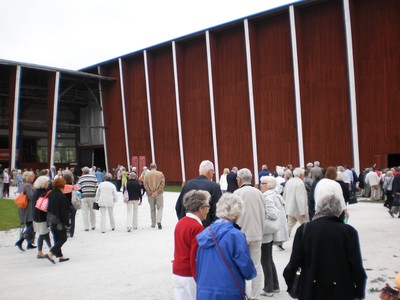
The opera was performed in the building to the right, where lumber used to be stored. The building has excellent acoustics.

The performers
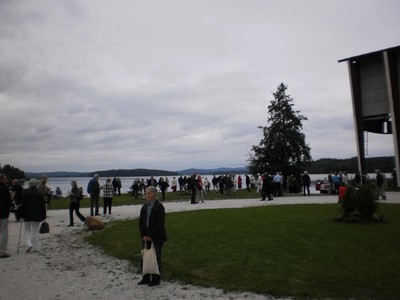
The view from outside the opera house over the lake Ljusnarn.

The opera was performed in the building to the right, where lumber used to be stored. The building has excellent acoustics.

The performers

The view from outside the opera house over the lake Ljusnarn.
Pizza hos Tony med Hjalmar och Elsa
För några veckor sedan var jag med Hjalmar och Elsa och åt pizza hos Tony i Ludvika. När jag var här med bara Elsa i början av juni fick hon en hjärtformad pizza, och när Hjalmar hörde det ville han också ha det. Snälla Tony bakade hjärtformade pizzor åt båda barnen. De tyckte det var jätteroligt och lät sig väl smaka.
Pizzerian heter alltså Pizzeria Monte Carlo och ligger på Tingshusgatan i Ludvika. Rekommenderas starkt. Tonys pizzor är de godaste jag ätit i Sverige.
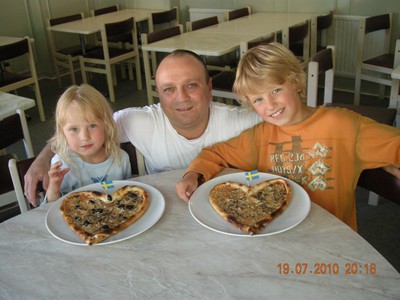

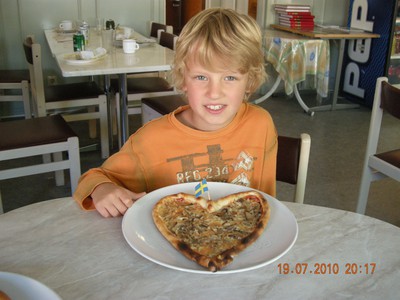
Jag hade ingen kamera när vi åt pizza. Tony tog bilderna med sin kamera, och jag fick dem från honom när jag var där och åt pizza igår.
Pizzerian heter alltså Pizzeria Monte Carlo och ligger på Tingshusgatan i Ludvika. Rekommenderas starkt. Tonys pizzor är de godaste jag ätit i Sverige.



Jag hade ingen kamera när vi åt pizza. Tony tog bilderna med sin kamera, och jag fick dem från honom när jag var där och åt pizza igår.
Hjalmar och Elsa
Hjalmar och Elsa är bästa vänner och leker väldigt bra tillsammans.




De har matchande Nintendo DS och de spelar med varandra.
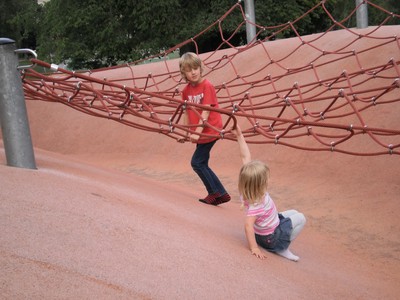





De har matchande Nintendo DS och de spelar med varandra.


Elsas dagis på utflykt till Stora Skuggans 4H-gård
Jag var med när Elsas dagisklass gjorde en utflykt till Stora Skuggans 4H-gård. Det var jättespännande att få se grisar och getter och hästar och kaniner.
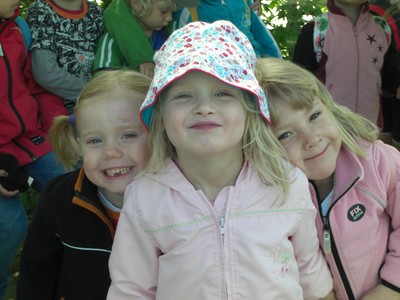
Tre fotomodeller på väg till Stora Skuggan: Frida, Elsa, Klara.
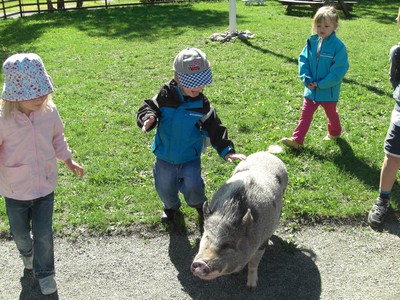

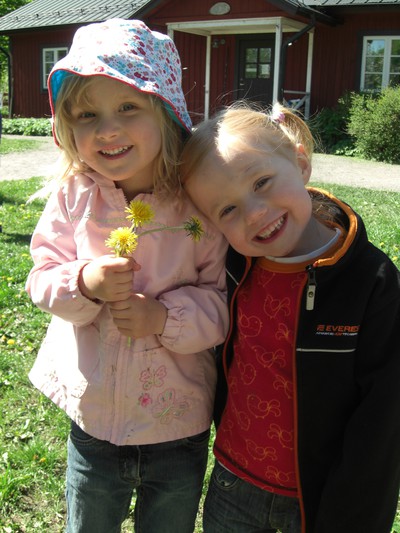

Vi fick också åka häst och vagn!
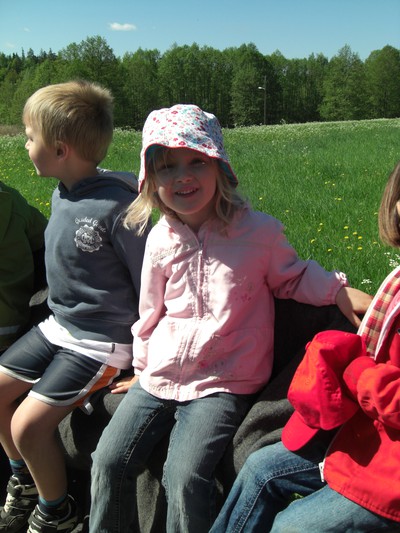
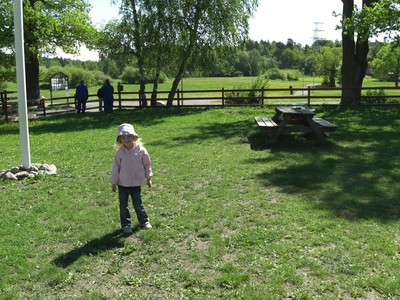
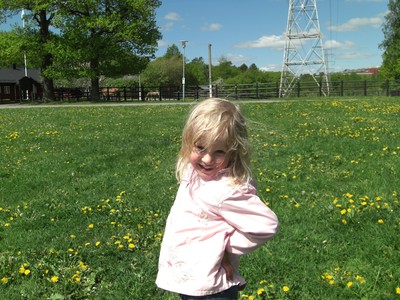

Tre fotomodeller på väg till Stora Skuggan: Frida, Elsa, Klara.




Vi fick också åka häst och vagn!



